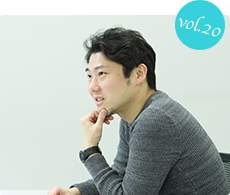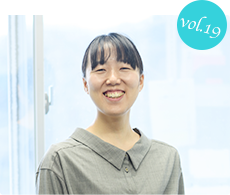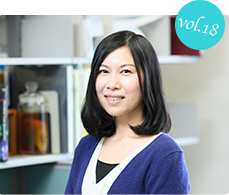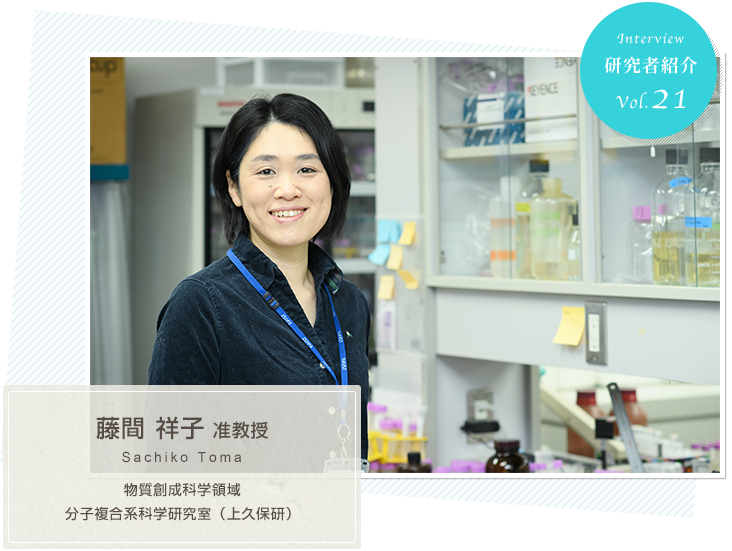
![]()
D. degree from the Graduate School of Science, Osaka University in March 2006. She has been an assistant professor at the Graduate School of Pharmaceutical Sciences, The University of Tokyo since April of the same year, and an associate professor at Nara Institute of Science and Technology since October 2018. Her specialty is structural biology.
Why did you become a scientist?
I did not have a dream or anything like that since childhood; I am rather pragmatic and came to the present through a combination of various coincidences.
I have been good at logical thinking since high school. I never thought of it as a separate humanities or science subject, but as subjects, mathematics, physics, and chemistry were easy to understand and I could get good grades in them. I was born in Shimane Prefecture in the countryside, so I didn't have the image of women in science around me, but I chose chemistry as my undergraduate major because I thought I would be most successful in chemistry. Until then, I had only thought about which subjects were easy to get good grades in and which subjects I should not take because I was not good at them.
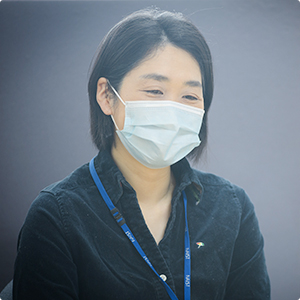
It was also during my undergraduate years that I met Dr. Konno, who specializes in structural biology, which is my current field of study. While studying basic organic and inorganic chemistry, I learned that chemistry could be discussed using biomolecules, and I went straight to the structural biology lab for my master's degree. Some of my friends around me had found what they wanted to do and moved on to other universities when they entered the master's program, but I wanted to see how things went. Of course, I also wanted to continue the research I was doing at that time. While I was doing research, I decided that I wanted to go to a laboratory with many classmates and a large laboratory for the Ph.D. program, so I transferred to Professor Nakagawa's laboratory at the Institute of Protein Research, Osaka University.

When I was in D3 and thinking about joining a company after the Ph.D. program, I was approached by the Faculty of Pharmaceutical Sciences at Kumamoto University, which was looking for an assistant professor, and I thought it was a great opportunity, so I dropped out and took the job. While I was there, I was involved in setting up the lab and supervising students in conducting experiments and writing papers for my graduation. With your support, I was able to complete my Ph.D. at Osaka University after several years of enrollment. I decided to move to Tokyo to marry my husband, who had come to Tokyo Tech at that time for various reasons. Dr. Yamagata, who was the organizer of my laboratory at Kumamoto University, asked me if I would like to continue my research and look for a job, and he introduced me to a position in the exact same field at Tokyo University. From there, I stayed in Tokyo for more than 10 years, including raising my children. During that time, the organizer of my laboratory changed from Dr. Sato to Dr. Shimizu, but my field remained the same and I was able to continue my own research.。
In the course of my research, there was a time when I was struggling with what kind of life phenomena to study and what methods to use to study them, and at that time I did a little research involving solution scattering of proteins, which was Professor Kamikubo's area of expertise. I was able to obtain enough data to write a paper, and I also attended related research meetings to study. I gave a presentation to a research group that Dr. Kamikubo was attending, and he approached me about my current position. I felt that I needed to move on to the next position because of my age, so I accepted the challenge and was hired.
Looking back, it was only when I entered Osaka University that I made my own decision, and after that things just kind of flowed to where I am today. I had tenure at both Kumamoto University and the University of Tokyo, and considering my current situation, it was a blessed position. I had been following my career due to occasional life events, but once I had found my own direction in research and my children had settled down, I decided to give it my all and do my best.
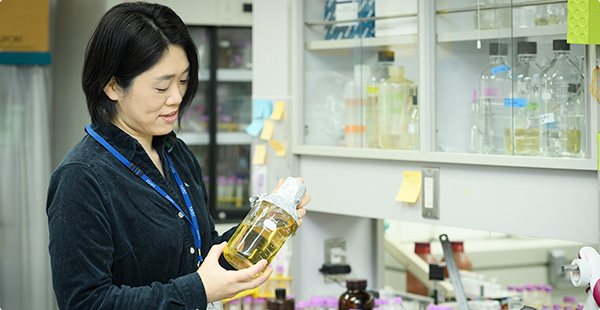
When I arrived at the university, my younger son was in third grade and my older son was in sixth grade. My husband is a researcher in the same field as my elder son, but my younger son stayed in Tokyo with my husband. My husband is a researcher in the same field, but he moved to Tokyo University the year my oldest child was born, the same year as my previous position, and moved to Kyoto University last year. We now live together as a family in Kansai. I am very lucky. You can't control luck, and the older I get, the more I realize how important timing is. The older I get, the more I think that timing is more important. I am where I am today because of the support of the people around me.
When my oldest child was born, I took six months of parental leave, but there was no place to take him when I wanted to return to work. When my child turned one, we moved to a daycare center near our home. My youngest child was born in January, and I only took one month of paternity leave before returning to work in April. At first I thought I was doing well, but halfway through I began to suffer from a loss of energy. My work efficiency was poor, and I couldn't sleep because she cried at night. I suddenly regretted that I should have rested a little longer. At that time, my husband and I shared the responsibility of taking care of the baby until 4:00 a.m., and then I would pass the baton to him. My husband's parents live in Hiroshima and mine in Shimane, so when I had to go on business trips or take measurements, I asked both parents to come and support me. I couldn't take care of him alone, so they came to Tokyo many times. I am very grateful for that. Our parents' generation is the generation of full-time housewives. They had a lot of things to do, but they made time to come from the countryside to support us. But when my children reach the age of parenthood, will I be able to support them with the same light footwork that my parents did? I am sure that social systems will be established in the future, but I wonder what will happen and what I can do to help them.
Daily schedule
I wake up around 5:30 or 6:00 a.m., make lunch for my oldest child, do laundry and prepare meals, leave the house around 8:00 a.m., and arrive at work around 9:00 a.m. After covid-19, I leave the house a little later, so I do some cleaning in the morning. I leave work around 6:30 pm and get home around 7:30 or 8 pm. On the way home, I usually stop at the grocery store to buy dinner and make dinner. My husband does the laundry and washes the dishes.
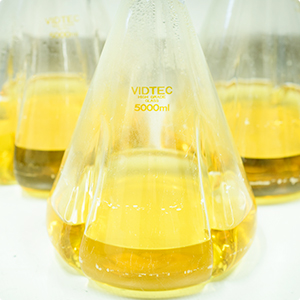
Sometimes I do the remaining desk work at home, but less and less these days. When my child was in daycare, I had to pick him up at 6:00 p.m. to finish my work, so I used to work on documents at home. I check my e-mail, but I try not to bring home paperwork that has a known deadline. Whenever possible, I ask about deadlines, think about when I will do it, and try to get it done at work. On Saturdays and Sundays, I do desk work, such as budgets and reports. On Sundays, I sometimes decide "I'm not going to do anything today" and take it easy.
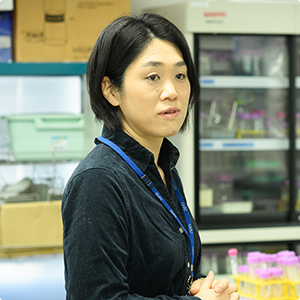
On the research environment and support for balancing research and work
I think the research environment is good. I have rarely felt disturbed. Maybe I am not that particular. The technical staff is well organized and access to the machines is good. As for the location of the university, it is easy to get to Nara Medical University and Ritsumeikan University, where we have recently started collaborative research, and to Osaka University, which has helped us with measurements, and I think it is also easy to get to Tokyo.
I pursued the idea of doing research efficiently when my children were young, but now that they are somewhat grown up, the burden of life events has lessened. For example, I have no problem leaving the office at 7:00 or 8:00 p.m. When I think about it, I don't see my kids studying at all (laughs), but it's not as hard as it used to be. Also, in my case, both when my children were small and now, I am in a laboratory where I have free time, so I have been able to manage my research and my life at my own discretion.
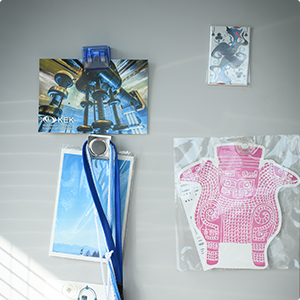
I took care of my parents for about a month at the end of the year and the beginning of the new year. For about two weeks after the beginning of the year, I used the COVID-19 telecommuting system to write papers and supervise students, but I was able to work and spend peaceful time by my parents' side. My parents were told they had only a few months to live, so I think this is different from caregiving, where there is no time limit, but the time I spent at home with my father, who was told he had only about a month to live, overlapped with the month I spent with my child who was about to be born. When I went home to give birth, I took my papers back to my parents' house and stayed there while I worked until the baby was born.
But while maternity leave is something to celebrate, I felt that caring for a child was a different quality. Also, children are brand new, but parents have their own world. Even if I wanted to be there for them, they would say to me, "Why should I adapt to their world? In my case, experimentation is also important, so it would have been better from an educational point of view if I could have gone to work, but during the care period I cut back on experimentation and shifted my work to what I could not do before and what I could do because I was at home. However, I think there are cases where it is difficult, depending on the content of the research, and I think institutional issues will arise when our faculty members are faced with caregiving. This is not just an issue for our university.

(January 2021)

-
2020.3 updated
Division of Materials Science
-
2020.3 updated
Division of Materials Science
-
2020.3 updated
Data Science Center






